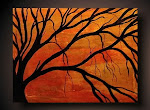This special season of the month of October is known by the name of Vetrnætr or Veturnætur in old Scandinavia, which can be translated as Winter nights, as it is most commonly known, or by Vetrarblót or Vinternatsblót, refering to the celebration it self.
You might get confused, because some people celebrate Winter Nights at the 31st of October to the 1st of November, or because the name it self is about winter and we are still at autumn, but in the old times there wasn't such thing in Scandinavia or to most of the Europeans, a season called Autumn, there wasn't the precession of the existance of the transition from light to darkness which is so typical in this month, there was just Spring, the Summer and when the days became colder, with leafs falling, the rain and thunder and the first snowflakes, it was the coming of winter and that's it. This celebration was started at the 14th of October by night, so its full day was the 15th, as the name indicates, it was the night of winter or the day where all the preparation for the coming of winter started, before the deep winter times, people gathered their food, wood, coal, fruits and roots, storing these in safe places to survive the severe winter. It was also the beginning of the month of hunting, called gormândhr, slagtmanad or blotmanad, which can be translated as, time of killing or of slaughter, because at winter, hunting was the only way of sustenance if the stored food was gone, taken or spoiled, and there was some people that lived only from the wilds and did not harvest or had cattle, and when winter came, the ice and frost killed every plant and leaf, and eatable roots or mushrooms were hard to find, and those people were forced to hunt if they wanted to live through. But for those who had cattle and owned farmland, this celebration was the piriod of two days, that marked the coming of winter, time to bring the cattle in doors from the pastures, to maintain the breeding, slaughter the remaining and preserve their meat to provide food, this is why the celebrations of this season are known as sacrificial feast, in which gods, elves, ancestors etc were always welcomed. Friends, relatives and other honorable guests, would gather at the farmstead halls for the feast, play games at the icy lakes during the day, and eat and drink during the night. The animals were killed in a ritual manner and their blood given to the gods, especially to Freyr, the god of agriculture, fertility and lord of all living animals who teaches the people to respect all the animals and treat them the best possible as long as they live, and how important they are in the cycle of life. Part of the meat was also given to the land spirits and to the ancestors, back to nature where it started and lived and where it must rest, to give life and sustenance, nourishment, to others.





0 comentários:
Post a Comment